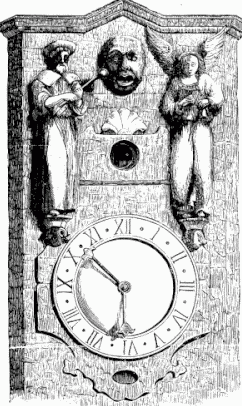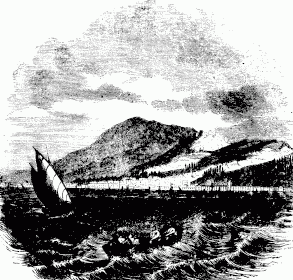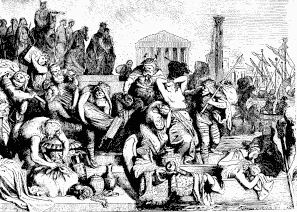
One good thing came of the Gothic conquest—the pagans were put to silence for ever. The temples had been razed, the idols broken, and no one set them up again; but the whole people of Rome were Christian, at least in name, from that time forth; and the temples and halls of justice began to be turned into churches.
Honorius still lived his idle life at Ravenna, and the Bishop—or, as the Romans called him, Papa, father, or Pope—came back and helped them to put matters into order again. Alaric had left no son, but his wife's brother Ataulf became leader of the Goths. At Rome he had made prisoner Theodosius' daughter Placidia, and he married her; but he did not choose to rule at Rome, because, as he said, his Goths would never bear a quiet life in a city. So he promised to protect the empire for Honorius, and led his tribe away from Italy to Spain, which they conquered, and began a kingdom there. They were therefore known as the Visigoths, or Western Goths.
Arcadius, in the meantime, reigned quietly at Constantinople, where St. John Chrysostom, the golden-mouthed preacher of Antioch, was made Patriarch, or father-bishop. The games and races in the circus at Constantinople were as madly run after as they had ever been at Rome or Thessalonica; there were not indeed shows of gladiators, but people set themselves with foolish vehemence to back up one driver against another, wearing their colors and calling themselves by their names, and the two factions of the Greens and the Blues were ready to tear each other to pieces. The Empress Eudoxia, Arcadius' wife, was one of the most vehement of all, and was, besides, a vain, silly woman, who encouraged all kinds of pomp and expense. St. Chrysostom preached against all the mischiefs that thus arose, so that she was offended, and contrived to raise up an accusation against him and have him driven out of the city. The people of Constantinople still showed so much love for him that she insisted on his being sent further off to the bleak shores of the Black Sea, and on the journey he died, his last words being, "Glory be to God in all things."

Arcadius died in 408, leaving a young son, called Theodosius II., in the care of his elder sister Pulcheria, under whom the Eastern Empire lay at peace, while the miseries of the Western went on increasing. New Emperors were set up by the legions in the distant provinces, but were soon overthrown, while Honorius only remained at Ravenna by the support of the kings of the Teuton tribes; and as he never trusted them or kept faith with them, he was always offending them and being punished by fresh attacks on some part of his empire, for which he did not greatly care so long as they let him alone.
Ataulf died in Spain, and Placidia came back to Ravenna, where Honorius gave her in marriage to a Roman general named Constantius, and she had a son named Valentinian, who, when his uncle died after thirty-seven years of a wretched reign, became Emperor in his stead, under his mother's guardianship, in 423.
Two great generals who were really able men were her chief supporters—Boniface, Count or Commander of Africa; and Aëtius, who is sometimes called the last of the Romans, though he was not by birth a Roman at all, but a Scythian. He gained the ear of the Empress Placidia, and persuaded her that Boniface wanted to set himself up in Africa as Emperor, so that she sent to recall him, and evil friends assured him that she meant to put him to death as soon as he arrived. He was very much enraged, and though St. Augustine, now an old man, who had long been Bishop of Hippo, advised him to restrain his anger, he called on Genseric, the chief of the Vandals, to come and help him to defend his province.

The Vandals were another tribe of Teutons—tall, strong, fair-haired, and much like the Goths, and, like them, they were Arians. They had marauded in Italy, and then had followed the Goths to Spain, where they had established themselves in the South, in the country called from them Vandalusia, or Andalusia. Their chief was only too glad to obey the summons of Boniface, but before he came the Roman had found out his mistake; Placidia had apologized to him, and all was right between them. But it was now too late; Genseric and his Vandals were on the way, and there was nothing for it but to fight his best against them.
He could not save Carthage, and, though he made the bravest defence in his power, he was driven into Hippo, which was so strongly fortified that he was able to hold it out a whole year, during which time St. Augustine died, after a long illness. He had caused the seven penitential Psalms to be written out on the walls of his room, and was constantly musing on them. He died, and was buried in peace before the city was taken. Boniface held out for five years altogether before Africa was entirely taken by the Vandals, and a miserable time began for the Church, for Genseric was an Arian, and set himself to crush out the Catholic Church by taking away her buildings and grievously persecuting her faithful bishops.
Valentinian III, made a treaty with him, and even yielded up to him all right to the old Roman province of Africa; but Genseric had a strong fleet of ships, and went on attacking and plundering Sicily, Corsica, Sardinia, Italy and the coasts of Greece.
Britain, at the same time, was being so tormented by the attacks of the Saxons by sea, and the Caledonians from the north, that her chiefs sent a piteous letter to Aëtius in Gaul, beginning with "The groans of the Britons;" but Aëtius could send no help, and Gaul itself was being overrun by the Goths in the south, the Burgundians in the middle, and the Franks in the north, so that scarcely more than Italy itself remained to Valentinian.

The Eastern half of the Empire was better off, though it was tormented by the Persians in the East, on the northern border by the Eastern Goths or Ostrogoths, who had stayed on the banks of the Danube instead of coming to Italy, and to the south by the Vandals from Africa. But Pulcheria was so wise and good that, when her young brother Theodosius II. died without children, the people begged her to choose a husband who might be an Emperor for them. She chose a wise old senator named Marcian, and when he died, she again chose another good and wise man named Zeno; and thus the Eastern Empire stood while the West was fast crumbling away. The nobles were almost all vain, weak cowards, who only thought of themselves, and left strangers to fight their battles; and every one was cowed with fear, for a more terrible foe than any was now coming on them.
